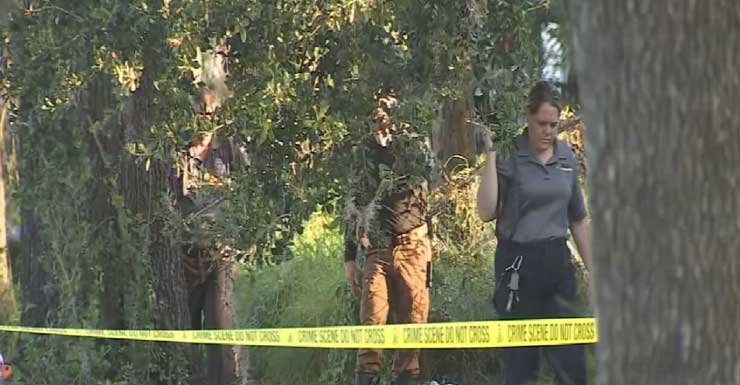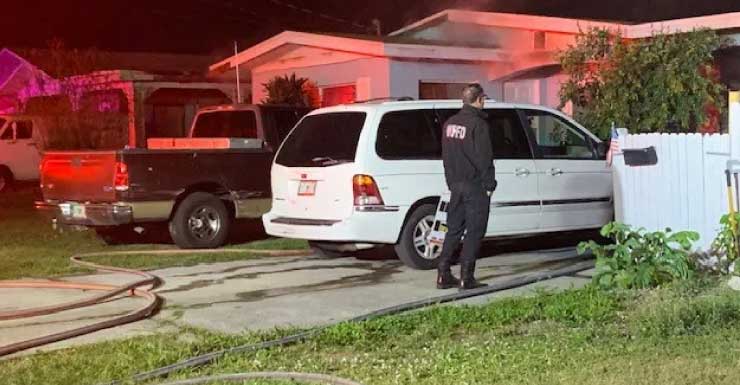Earlier this month, we reported how a gay man was fatally shot at a dog park by another parkgoer who witnesses say harassed him for months.
Hillsborough County Sheriff’s Office detectives and the Hillsborough County State Attorney’s Office say they are now investigating whether the shooting was a crime or a case of “stand your ground.”
In an I-Team follow-through, which is our commitment to staying on top of stories that matter to you and our community, we talk to legal experts about the law, the evidence, and how it may play out in this case.
“This morning, while I’m walking, we’re the only two people here, and he comes up to me and screams at me, ‘You’re going to die. You’re gonna die,’” Walt Lay said in a video he recorded and sent to a friend on Feb. 1.
He was documenting a threat he said he received from Gerald Declan Radford, another parkgoer who Lay’s friends say taunted Lay for months because he was gay.
On Feb. 2, Radford shot and killed Lay at West Dog Park, which the two men frequented for more than two years.
Radford has not been charged, is claiming self-defense, and doesn’t want to talk.
“I’m nowhere near over this. I’m nowhere near ready,” Radford told the I-Team a week after the shooting.
Radford sent a text hours after the shooting showing a cut and bruise on his face and writing, “Walt attacked me at the park, and I had to defend myself.”
With no known witnesses or video, law enforcement must now decide if the shooting was a crime.
In 28 states, there is no duty to retreat from an attacker if you are somewhere you’re legally allowed to be.
Ten states include the language “Stand Your Ground” in the law, including Florida, where it was first adopted in 2005.
Prosecuting self-defense cases can be a difficult call
Former Hillsborough County State Attorney Andrew Warren wouldn’t talk specifically about the dog park case, but he said without other witnesses or video, it’s difficult to refute self-defense claims.
“In these types of self-defense, stand-your-ground cases, the legal question, the decision whether to charge, can be really complicated even if you know all the facts,” Warren said.
As State Attorney, Warren posted deadly force case reviews on his office’s website.
Prosecutors found deadly force was justified and did not file charges in all six listed cases.
“Prosecutors and law enforcement can agree that this is what probably happened, and someone probably should be charged with a crime. But the law doesn’t work with probably. Prosecutors have a much higher standard before they can file charges in a case,” Warren said.
Florida has many high-profile cases
The I-Team also requested interviews from current Hillsborough County State Attorney Susan Lopez and former State Attorney Mark Ober, but neither responded.
tand your ground cases often make headlines in Florida.
In 2012, George Zimmerman, a neighborhood watch volunteer, shot and killed an unarmed Trevon Martin after he claimed the teen attacked him.
Zimmerman was arrested but was later acquitted.
In 2014, Curtis Reeves shot and killed Chad Olson in a Pasco County movie theater after Olson threw popcorn at him.
At his trial eight years after the shooting, Reeves was found “not guilty.”
Last June, a Pinellas County homeowner fired 30 rounds at his pool man after mistaking him for a burglar when he came to clean the pool after dark.
None of the shots hit the pool man, and the homeowner was cleared.
“It’s probably one of those things I would call lawful but awful. It’s lawful, but it’s an awful set of circumstances,” Pinellas County Sheriff Bob Gualtieri said at the time.
The only recent high-profile conviction in a deadly force case in the Tampa Bay area involved Michael Drejka, convicted of manslaughter and sentenced to 20 years in prison.
Drejka shot and killed Marquis McGlockton in 2018 during an argument over a handicapped parking space.
Drejka told investigators he felt threatened after McGlockton pushed him to the ground.
Experts offer opinions
We asked experts how the facts surrounding the dog park shooting might play out in determining whether a crime occurred.
“The facts and circumstances just don’t fit the story,” said Cooley Law School Professor Jeff Swartz.
He believes detectives could build a case based on circumstantial evidence.
“This would be planning, motive, intent… all can come in from what he says to other people,” Swartz said.
And Swartz questions whether Radford had other options to defend himself that would not involve deadly force.
“Even if it’s true, let’s assume for a moment that the victim did punch him. That doesn’t justify shooting him. He has an aggressive dog. Sic the dog on him,” Swartz said.
Defense attorney Jennifer Strouf agrees.
“Someone punching me in the face? That doesn’t give me a right to pull a gun,” Strouf said.
She stressed that the self-defense immunity concept can trigger a motion hearing.
What the judge must find to dismiss the claim is that the State has not proved by clear and convincing evidence that the defendant was not justified in the use of deadly force.
If the judge denies Stand Your Ground, a defendant can still use self-defense as a justification for using deadly force at trial.
Stoupf said as a defense lawyer, she would not want a jury to see Walt’s video.
“I would, of course, be trying to keep that video out,” she said.
And she believes the text message could be used against Radford.
“From a state’s side, they might say, hey, this is a person trying to create a self-defense when it wasn’t there,” Strouf said.
But she said the text message could also be used to show that Radford was in fear for his life when he shot Lay.
Swartz said there is enough circumstantial evidence for prosecutors to consider charges.
“All of that adds up to a case, which under the right jury, you could get a conviction,” Swartz said.
Walt’s friends recently held a vigil and have started a Facebook group called “Justice4Walt.”
But those we talked to said they still hadn’t been interviewed by detectives.
Embarking on Your Path to Recovery: Ovadia Law Group’s Expertise in Personal Injury Cases
When life throws unexpected challenges your way, Ovadia Law Group is here to be your ally in the pursuit of justice and recovery. Our seasoned team of attorneys specializes in personal injury cases, offering a wealth of experience to guide you through the legal complexities. Your journey begins with a simple call to 1-800-674-9396, unlocking a free consultation where we listen to your story, discuss the specifics of your case, and provide valuable insights into your rights.
At Ovadia Law Group, we understand that personal injuries are not just legal matters; they deeply impact your well-being. That’s why our commitment goes beyond representation – we provide personalized attention, ensuring you feel supported and empowered throughout the entire legal process. Trust Ovadia Law Group to be your dedicated advocates, fighting for your rights and working towards the fair compensation you deserve. Call us today and let us be your partners on the road to recovery.
Source: abcactionnews





